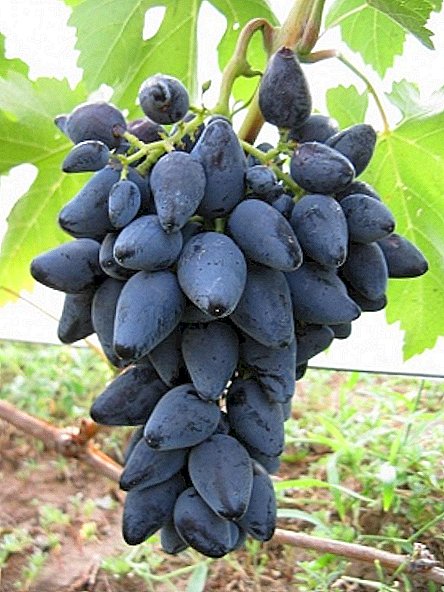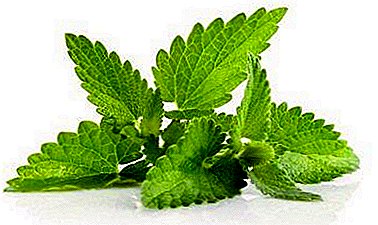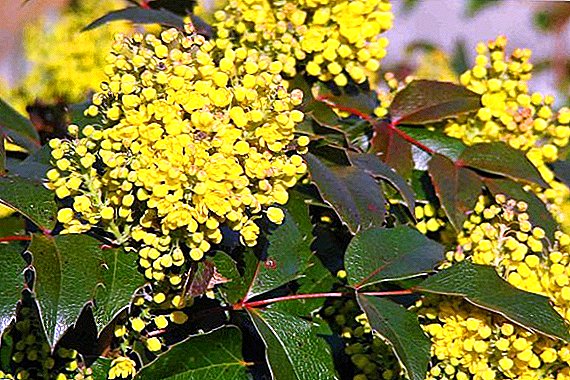 No matter how much we want to grow a good crop without a single chemical treatment, alas, this is not always possible.
No matter how much we want to grow a good crop without a single chemical treatment, alas, this is not always possible.
Most often with insect pests and diseases of crops have to fight with the help of insecticides - special chemical compounds, used to kill insects, their larvae, their eggs, as well as nematodes and ticks.
Interesting! The name "insecticides" comes from the Latin words "insectum" (translated as "insect") and "caedo" (kill).The degree of effectiveness, and at the same time, the danger / safety of such preparations should be determined on the basis of their chemical composition, since one name will give you nothing. It is noteworthy that it is the chemical composition that makes it possible to divide insecticides into as many as 11 types, although today we will pay attention to only one means - "Alatar".
Insecticide "Alatar": general information
Means "Alatar" belongs to the group of drugs with contact-intestinal action. It is ideal for controlling pests of the garden, reliably protecting the site from diseases. The drug helps to cope with aphids, leafworm, moth, flower beetle, cabbage moth, honeycake, raspberry-strawberry weevil and other uninvited guests.
 Due to its availability and ease of preparation of the working solution, the insecticide "Alatar" occupies one of the places of honor in the "first-aid kit" of every gardener and gardener. Only 10-15 ampoules will provide reliable protection of your plants for the whole season. It can be used together with hunting belts, due to which the effect of the drug is significantly increased and its consumption is reduced.
Due to its availability and ease of preparation of the working solution, the insecticide "Alatar" occupies one of the places of honor in the "first-aid kit" of every gardener and gardener. Only 10-15 ampoules will provide reliable protection of your plants for the whole season. It can be used together with hunting belts, due to which the effect of the drug is significantly increased and its consumption is reduced.
The insecticide described is marketed as a concentrated emulsion, placed in 5 ml ampoules or in 25 ml vials. To prepare the working solution, the contents of the ampoule are diluted in a small amount of water (approximately 2-3 liters), and then more liquid is added to achieve the specified norm. Each culture requires its own amount of the drug "Alatar", as stated in the instructions for its use. Anyway the total volume of the solution should be 10 liters (the solution must be mixed).
Important! So that the insecticide is completely removed from the plant cells and does not harm human health, it is worth using it at least three weeks before harvest..
Active ingredient and mechanism of action
If you believe the reviews of summer residents, Alatar is much more efficient in coping with its tasks than other similar means. It was possible to achieve similar results due to the presence in its composition of two potent substances at once: cypermethrin and malathion. Malathion (or karbofos) belongs to the class of organophosphorus compounds with a broad spectrum of action. "Alatar" perfectly protects plants from aphids (namely, it most often hosts the area), and also prevents massive attacks of insects and ticks.
 The second constituent is a contact-intestinal insecticide, which is distinguished by high initial activity and causes paralysis of the nervous system of pests, both in adults and in larvae. In addition, the Alatar includes a special adhesive that performs a special task - it is he who prevents the solution from rolling off the leaves or being washed out by the rain (You can find information about this in the instructions for use, which is attached to the preparation, or in the instructions from the network).
The second constituent is a contact-intestinal insecticide, which is distinguished by high initial activity and causes paralysis of the nervous system of pests, both in adults and in larvae. In addition, the Alatar includes a special adhesive that performs a special task - it is he who prevents the solution from rolling off the leaves or being washed out by the rain (You can find information about this in the instructions for use, which is attached to the preparation, or in the instructions from the network).
Did you know? Cypermethrin and malathion are precisely the substances that make it possible for the described agent to destroy the most persistent pests without fail, while possessing a synergistic effect (and their simultaneous use increases their strength).In general, the drug "Alatar" from pests is very resistant to the effects of ultraviolet rays and high air temperatures, so that it can persist on treated plants for up to 20 days.
Instructions for use of the drug "Alatar" for garden crops
As we noted earlier, for different crops a different amount of the described preparation is required, therefore, before proceeding to dilution of the working fluid, it is necessary to determine the dosage. Speaking about the tool "Alatar" and its instructions for use, we will not create any tables, but simply describe the dosage for the most common crops grown today.
Cabbage, potatoes, onions, carrots, strawberries
 Cabbage is sprayed with Alatar only during the active growing season. To prepare the working solution, the contents of the ampoule (5 ml) are diluted in 4 liters of water, after which the resulting composition is sprayed with plants. The consumption of the drug in this case is 4 liters per 100 m². Cabbage processing is used to eliminate the problem of whitefish, cabbage moth, scoops, thrips, leaf beetles.
Cabbage is sprayed with Alatar only during the active growing season. To prepare the working solution, the contents of the ampoule (5 ml) are diluted in 4 liters of water, after which the resulting composition is sprayed with plants. The consumption of the drug in this case is 4 liters per 100 m². Cabbage processing is used to eliminate the problem of whitefish, cabbage moth, scoops, thrips, leaf beetles.
Spraying the potato preparation should be carried out only with the mass appearance of pests. As in the previous case, you will need 4 liters of working fluid per 100 m², and the duration of the manual work is 10 days. Insecticide used in the fight against Colorado potato beetle and ladybug.
A working solution is prepared according to the same scheme for spraying onions, carrots and strawberries: 5 ml of the preparation must be diluted in 4 liters of water. In these cases, the remedy for pests "Alatar" (according to the instructions) will help to get rid of carrot listobloshki, onion flies and protect the strawberries from raspberry-strawberry fruit-bearing.
Apple tree
Spraying the garden apple tree, and with it the pears and quince, is performed during the active growing season of the trees, after diluting 5 ml of the preparation in 10 liters of water. On average, about 5 l of the working composition is spent on one tree: 3 l - for young specimens and 6-8 l - for adult planting. The most frequent enemies of the apple tree are moths, flower beetles, aphids, moths, moths, sawflies, leafworms, and Alatar copes with them perfectly.
Currant
 For processing currants and gooseberries, 5 ml of the drug must be diluted in 5 liters of water.
For processing currants and gooseberries, 5 ml of the drug must be diluted in 5 liters of water.
The consumption of working fluid is up to 1 l per bush, which helps to get rid of aphids.
Did you know? The darker the currant is, the more useful it is. However, this statement concerns only the content of vitamin C in berries (it is 5 times more in black currants than in red).
Ornamental trees, shrubs and flower crops
To get rid of pests, the Alatar solution also helps in the cultivation of ornamental shrubs and trees on your site. For such plants need special care, so they are sprayed three times: before and after flowering, as well as during the growing season. Consumption of the finished solution is 1.5 liters per 10 m², and spraying is best done early in the morning or with the onset of the evening (after sunset), in calm and dry weather. All leaves of the plant should be moistened evenly, 4-6 hours before the expected precipitation.
The optimal temperature for the procedure is + 12 ... +25 ° C. "Alatar" to fight insects protects ornamental trees from sucking and leaf-eating pests, dipterans and trunk uninvited guests (this is also indicated in the instructions). For the treatment of such plants, 5 ml of the preparation (one ampoule) is diluted in 3.5 liters of water.
“Alatar” is also suitable for the treatment of indoor plants, and although the instructions for use do not indicate the recommended dosage for flowers in pots, they can be sprayed with the same composition that you use to treat ornamental shrubs.
The advantages of using the drug "Alatar" to fight insects
 All the chemical compounds used today have one or another useful properties, but as far as "Alatara" is concerned, in comparison with competitors It has the following advantages:
All the chemical compounds used today have one or another useful properties, but as far as "Alatara" is concerned, in comparison with competitors It has the following advantages:
- has high efficiency, which is largely due to the presence of two potent components that contribute to the complete destruction of even the most resistant to chemicals pests;
- contains a special adhesive that prevents flushing or accidental removal of the drug from the leaves of the treated plants;
- has a longer period of use, which is explained by the low consumption rate of the agent (most often one ampoule with a volume of 5 ml is enough for 10 liters of liquid).
Security measures when working with the drug
When working with any chemicals, you should always take precautions. Firstly, it is better to carry out processing in calm weather or so that a small wind comes from you. Secondly, be sure to close with clothing all open areas of the body (wear gloves and a hat). Do not be over glasses and respirator, because so you can fully protect your eyes, digestive tract and respiratory system. Also be sure to ensure that when performing the procedure, there are no people or animals nearby.
 During the spraying can not smoke and eat. If, despite all precautions, the chemical still gets into the eyes or on the skin, they must be rinsed with copious amounts of clean running water. If the composition enters the body through the mouth, rinse it thoroughly with water, drink several glasses of warm water or milk and take activated carbon at the rate of 1 g per 1 kg of body weight. After that, by irritation of the posterior pharyngeal wall, vomiting should be induced.
During the spraying can not smoke and eat. If, despite all precautions, the chemical still gets into the eyes or on the skin, they must be rinsed with copious amounts of clean running water. If the composition enters the body through the mouth, rinse it thoroughly with water, drink several glasses of warm water or milk and take activated carbon at the rate of 1 g per 1 kg of body weight. After that, by irritation of the posterior pharyngeal wall, vomiting should be induced.
After doing the work, immediately wash your hands with soap and, if possible, take a shower.
Important! Container from under the drug can not be used for storing other means (even after thorough cleaning), as well as throw it into the sewer system or water bodies.
Storage conditions and shelf life "Alatara"
Alatar as a remedy for aphids, bedbugs, ticks and other pests is supplied in the form of ampoules (5 ml) or 25 ml bottles. In any case, the shelf life of the composition should not exceed two years. All this time, the packaging with the drug should be in a dry, darkened room with temperature indicators -5 ° C ... +25 ° C, separately from food and drugs. In addition, neither children nor pets should have access to it. Also means should be protected from fire.
 Of course, work in the garden and in the garden can not be called an easy task, besides the end result does not always depend only on diligence. In addition to the human factor, weather and climate conditions play a significant role, but this does not mean that you will have to come to terms with it. Having treated plants with means "Alatar" You will help them cope with one of the biggest problems - insect pests, and healthy cultures will be better able to tolerate cold wind or rain.
Of course, work in the garden and in the garden can not be called an easy task, besides the end result does not always depend only on diligence. In addition to the human factor, weather and climate conditions play a significant role, but this does not mean that you will have to come to terms with it. Having treated plants with means "Alatar" You will help them cope with one of the biggest problems - insect pests, and healthy cultures will be better able to tolerate cold wind or rain.












